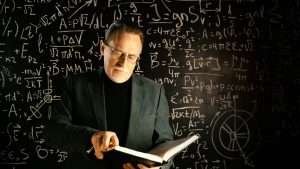Since I was a child, I watched people’s actions like an endless movie. I saw how strength carried power and how ruthless people acted before I realized what those concepts meant.
Even before I was old enough to date, I saw how girls responded to boys who conveyed an air of self-confidence.
And if these guys looked like they created fear in the eyes of others, that made them even more appealing.
I have always lived in the center of a city known as the “Inner City.” And the rules were much different from mainstream society.
It was either prey or be preyed upon.
As an INTJ boy, I was preyed upon.
One day, I was riding my new black and red ten-speed bicycle when a bigger boy grabbed my handlebars in an attempt to take my bike away.
He turned his head as if someone had called his name, releasing the handlebars and walking away.
As soon as he did, I rode off-scared, confused about what had just happened.
Another time, I was visiting a friend in a public housing complex. We all were playing inside a cardboard box when some boys folded the top flaps to close the box with us inside.
I felt like I couldn’t breathe as I panicked, saying, “Let me out!”
They let us out of the box, and we went inside my friend’s home for the duration of the visit.
There were countless occasions that I can recall where my quiet and reserved demeanor made me a target of attack.
I couldn’t wait to grow bigger and stronger to gain more power.
These experiences are typical of introverts in general and INTJs specifically.
I could go on incessantly about the coldness and callousness of the world, starting from my childhood to an occurrence of incivility at a gas station recently. Still, there is a more significant point to be considered.
How INTJs see the world
Over a lifetime, when I unpack most of my interactions with people outside of family and friends, a selfish motive seemed to be always at the center.
I tend to view life metaphorically. Eminent psychotherapist Alfred Adler once said that humans are slaves to their motivations.
And every act is motivated by some internal drive.
Author Susan Storm said that INTJs are:
…Less tuned into their environment and more tuned into abstract ideas, images, and conceptualizations. They tend to apply symbolic meaning to reality – not seeing something for what it is but turning it into a symbol that has an underlying meaning or significance for them.
I would slightly disagree with Storm’s assessment by suggesting that INTJs are tuned into their environment, and this synchronicity shapes their ideas, images, and strategies.
Because INTJs can readily decipher patterns, it does not take long to develop philosophies that outline causations, if not correlations, between seemingly disconnected phenomena.
Additionally, being first-born in a family impacts the sensitivity to power within environments and impressions of the world.
Noting Alfred Adler’s ideas, researcher Riley Hoffman said:
First-born children have inherent advantages due to their parents recognizing them as “the larger, the stronger, the older.”
This gives first-born children the traits of “a guardian of law and order.” These children have a high amount of personal power and value the concept of power with reverence.
Hoffman’s analysis is spot-on. As a first-born INTJ, I have always been curious about how and why the world operates as it does.
The machinations of how individuals achieve goals through selfishness and ruthlessness have quashed my idealism surrounding altruism.
I approach life as a social scientist using individuals within my symbolic Petri dish to observe how they respond to stimuli. The best experiences are when an action occurs, and I watch the response from start to finish without participants ever being aware.
I never tire of observing. But, on the contrary, I am most rewarded when I hypothesize about possible outcomes that could reveal the higher angels of the human spirit, only to witness the decadence of the greedy soul.
Based on these competing selfish interests, most results are negative or at least less advantageous to the general population, which causes a society to collapse in the long run.
Wikipedia describes “Societal collapse” (or civilization collapse) as:
…The fall of a complex human society is characterized by the loss of cultural identity and socioeconomic complexity, the downfall of the government, and the rise of violence. Possible causes of a societal collapse include natural catastrophe, war, pestilence, famine, and depopulation. A collapsed society may revert to a more primitive state, be absorbed into a stronger culture, or completely disappear…Virtually all civilizations have suffered this fate regardless of size or complexity.

Author Richard Dawkins in his book, The Selfish Gene, said:
Be warned that if you wish, as I do, to build a society in which individuals cooperate generously and unselfishly towards a common good, you can expect little help from biological nature. Let us try to teach generosity and altruism because we are born selfish (p. 3).
Dawkins hypothesized that biological genes are ruthlessly selfish in their desire to replicate themselves.
As an INTJ man, if I have taken a dystopic perspective of the world, it was an organic evolution.
I did not endeavor to fight against logical progression.
Invariably, I did not have a plan about how I wanted anecdotal facts to be steered.
I went where the facts led me.
In the end, these experiences shaped my philosophy and directed me to the work of philosopher Jean-Paul Sartre.
Sartre and Albert Camus are often credited for developing the concept of Existentialism.
One of Sartre’s famous quotes undergirds the basis of his concept, “Man is condemned to be free; because once thrown into the world, he is responsible for everything he does.”
Referencing Sartre’s Existentialism, Author Tarun Mittal said:
Jean-Paul Sartre believed that human beings live in constant anguish, not solely because life is miserable, but because we are ‘condemned to be free.’ While the circumstances of our birth and upbringing are beyond our control, he reasons that once we become self-aware (and we all do eventually), we have to make choices — choices that define our very ‘essence’ (para. 3).
If the world is power-driven and ruthless, I do not wish to create more bromides and platitudes to make sense of it.
Enough has been said about effective means for maneuvering within the world.
The great thinkers of history have laid bare the realities of human nature.
As such, I choose to live vicariously through thousands of years of philosophy to defend myself intellectually against a ruthless world.
There is nothing new under the sun; we merely need to act with the wisdom of the ages to save ourselves and define our existence.
—- Joaquin Montague

References
Dawkins, R. (1989). The selfish gene. New York: Oxford University Press.
Hoffman, R. (2020, May 17). Alfred Adler’s theories of Individual Psychology and Adlerian therapy. Simply Psychology. Retrieved from: https://bit.ly/3QEYjFT.
Mittal, T. (2017, June 21). To be is to be. Jean-Paul Sartre on existentialism and freedom. Your Story. Retrieved from: https://bit.ly/3dx0kpC.
Societal collapse (n.d.). Wikipedia. Retrieved from: https://bit.ly/3pdL0R9
Storm, S. (2018, Sept. 17). How you see the world, based on your personality type. Psychology Junkie. Retrieved from: https://bit.ly/3Aj266r.


